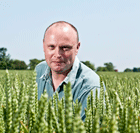VIDEO: Alan Ponder wins milling wheat trophy

Big yields, good quality and profit-boosting premiums are Alan Ponder’s three key aims when it comes to growing milling wheat.
The fact he can consistently deliver all three at Deal Hall Farm near Burnham-on-Crouch, Essex, goes some way to explaining why this unassuming but multi-skilled farm manager beat off all competition to lift this year’s nabim/Crops Milling Wheat Challenge trophy.
Given that he grew 960ha of the crop for last harvest, such consistency is no mean feat. He achieved an average yield of 9.95t/ha on his heavy alluvial clays, with full milling quality.
Solstice is his key variety, and looks like staying that way, averaging 10.8t/ha with a top-quality 80kg/hl specific weight, 400 Hagberg and 13% plus protein specification.
Battalion and Gallant also performed well, while two varieties with a great past still feature strongly.
Hereward has been at Deal Hall longer than Mr Ponder. This year it yielded a respectable 9.4t/ha. “It remains a mainstay variety due to its good standing ability and the additional premium that keeps it competitive.”
Soissons remains a favourite due to its early harvest and earning power. “The whole area was sold before sowing at a set Group 1 premium.”
The overall results are testament to Mr Ponder’s eye for detail. Nitrogen rates are tailored according to N-Min sampling, and applied in three splits to achieve optimum tiller numbers, which sets the scene for grain quality.
Crops receive a four-spray fungicide as standard to protect against all diseases, but especially brown rust, the main problem this far east.
Being BASIS-qualified, Mr Ponder does much of his own agronomy to ensure inputs are applied at the right time.
But producing plenty of good grain is only half the story – a good marketing strategy is vital. About half the crop is sold before harvest, often at fixed premiums. “It costs about £90/t to grow wheat, so if we can lock into a decent margin we will.
“We’ve always had a clear focus on the end user,” he explains. “We are lucky that we have several local mills at Tilbury, Maldon and Chelmsford.”
Maintaining those links will be vital, says Mr Ponder. “Given the rising world population, the demand for milling wheat can only go one way. Provided there’s a decent premium, we’ll carry on growing it.”
Why he won
- Culture of quality
- Excellent technical skills
- Strong marketing focus
- Building relationships with local millers
Judges’ view
Martin Savage, nabim trade policy manager and one of the three competition judges, says Mr Ponder has an excellent understanding of milling wheat agronomy and sells his crop well, making the most of good contacts in the supply chain.
“Mr Ponder is brimming with knowledge and has a clear vision for the crop,” Mr Savage adds.
“His understanding of millers’ requirements is particularly impressive.”
The Milling Wheat Challenge runners-up were David White, who farms 400ha at at Hawk Mill Farm, Cambridgeshire, and Guy Smith, who farms 600ha at Rainfall at Wigboro Wick, St Osyth, in Essex.

